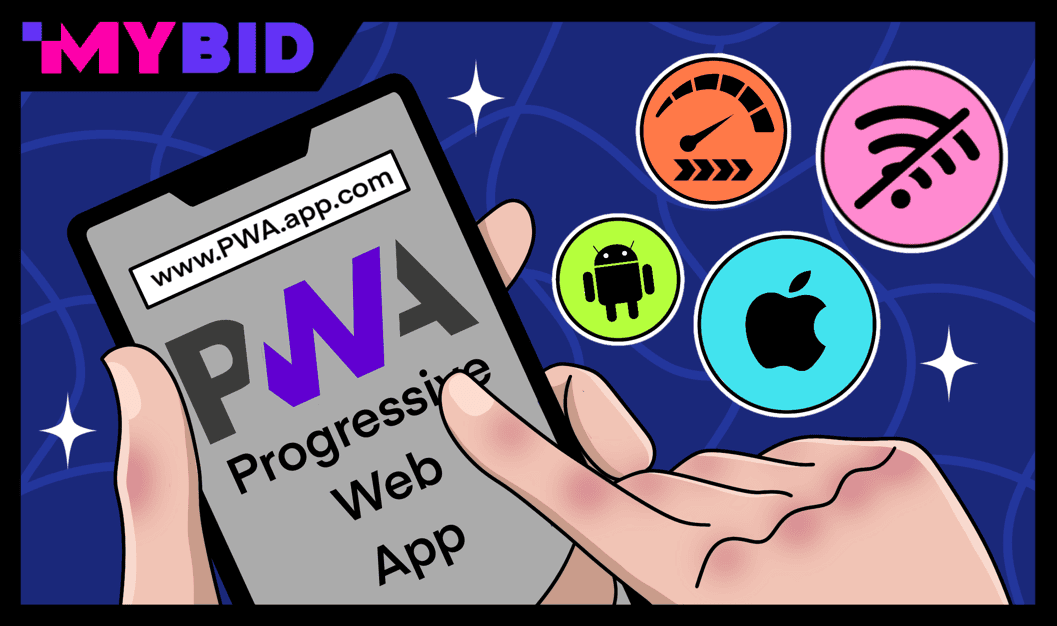
Users expect maximum convenience and performance from websites and applications. One of the solutions is PWA (Progressive Web Apps), which combine the benefits of websites and mobile apps.
In this review, we will explore what PWA is, how it works, and why it is gaining popularity in traffic arbitrage.
Progressive Web Apps (PWA) are becoming increasingly popular sources of traffic. Learn how MyBid can help you use PWA to attract your audience. Message our manager to start working with this tool and improve your results. Let's make your business more successful together!
PWAs are progressive web apps that function like regular websites but offer the functionality of mobile apps. They are developed using modern web technologies such as HTML, CSS, and JavaScript and can operate in any browser. The main goal of PWAs is to provide users with an experience similar to mobile apps, but without needing to download them from the App Store or Google Play.
PWAs can work offline by using data caching and support push notifications, making them convenient and practical for users. They offer high performance, quick access, and minimal delays.
The primary differences between PWAs and traditional mobile apps lie in their installation, updates, and accessibility. These differences make PWAs attractive to developers and users alike.
1. No Need for App Stores: PWAs do not require installation from app stores, simplifying their use. Users can add them directly to their device's home screen through the browser, speeding up access and reducing usage barriers.
2. Automatic Updates: Unlike mobile apps that need manual downloads and installations, PWAs update automatically and seamlessly for users. This ensures users always work with the latest version without manual updates.
3. Universal Compatibility: PWAs can operate on any device with a browser, whether it's a smartphone, tablet, or computer. This broadens their audience and makes them accessible across different platforms.
Like any technological solution, PWAs have their advantages and disadvantages. Let's explore these to understand why they are becoming more popular in traffic arbitrage.
Pros:
1. Universal Compatibility: PWAs work across all platforms and devices, simplifying their development and maintenance. This is crucial for companies aiming to reach a wide audience without creating separate versions for iOS and Android.
2. Ease of Installation: Users can easily add PWAs to their home screen, bypassing the app store download process. This makes apps more accessible and appealing.
3. High Performance and Autonomy: PWAs use caching to ensure fast loading and operation even without an internet connection. This is especially important for users with limited network access or slow internet speeds.
4. Automatic Updates: PWAs update automatically, keeping the app current without requiring users to manually update.
Cons:
1. Limited Functionality: Despite numerous benefits, PWAs have their drawbacks. One is limited functionality, as PWAs have restricted access to device hardware features like the camera or GPS, which can limit app capabilities.
2. Limited Support: Another downside is limited support on some devices and browsers. Not all browsers fully support PWA features, potentially leading to incomplete or incorrect app performance on certain platforms.
3. Not Available in App Stores: The absence of PWAs in app stores can hinder their popularity. Users might be unaware of PWAs since they cannot find them in the App Store or Google Play, limiting their accessibility.
We won't delve into development using code, frameworks, or layouts. After all, we understand that an arbitrageur doesn't necessarily need to know how to code, especially when there are various builders available. In the niche of affiliate marketing for creating PWA (Progressive Web Apps), there are many builders, and here are the most notable ones:
1. FBM.Red: One of the top PWA app builders on the market. You can create apps for any country and GEO. It offers a user-friendly analytics system, various tools, and excellent support to resolve any technical issues.
2. BlackApp.dev: On this platform, you can create an app in just a few seconds, add all necessary features, protections, and even configure push notifications! Additionally, arbitrageurs have access to various designs from a ready-made collection and can also customize them using the builder.
3. ZMA Apps: A marketplace for traffic arbitrage apps with a built-in PWA app builder.
Working with PWAs requires attention to detail and continuous improvement. Here are some tips to help you effectively use PWAs and maximize their benefits:
1. Focus on Users: Ensure your PWA is user-friendly and straightforward. Optimize the user interface and experience for comfort and ease of use.
2. Continuous Updates and Improvements: Regularly update and enhance your app based on user feedback and new technologies to make it even more valuable and functional.
3. Use Analytics Tools: Track user behavior and analyze your PWA's performance to understand which aspects need improvement and which features are most popular.
4. Drive Traffic: Use various marketing methods like SEO, content marketing, and social media to increase users and boost your app's popularity.
5. Ensure Security: Maintain a high level of security, protecting user data and preventing potential attacks. This helps retain user trust and ensures your app's reliability.